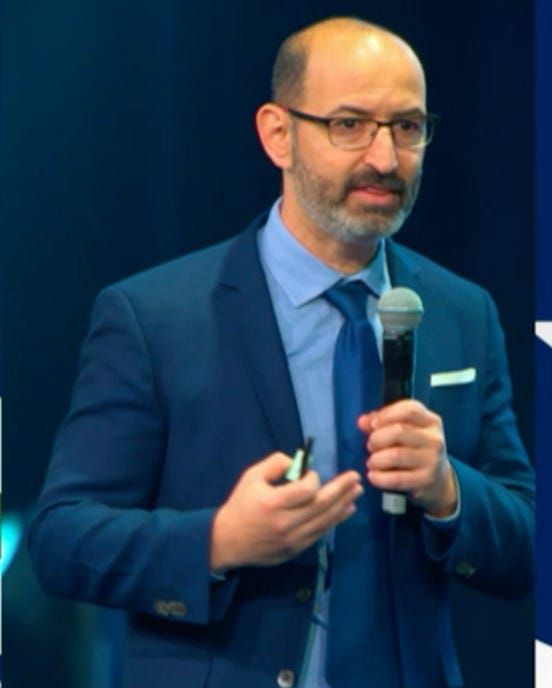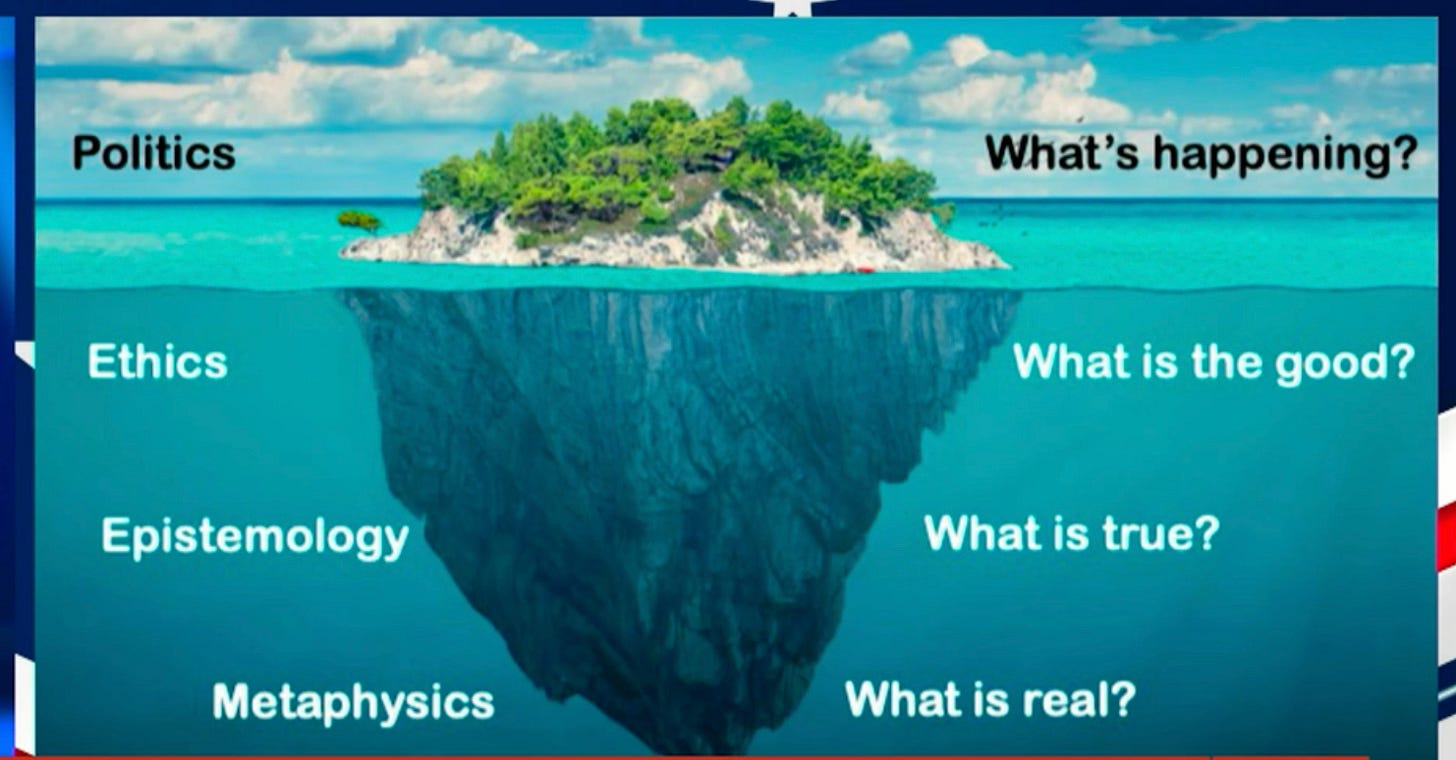PHILOSOPHY - WHO NEEDS IT?
Ayn Rand, The Ayn Rand Institute (ARI), and Interview with Tal Tsafany, President and CEO of ARI
A few weeks ago, I wrote about the CPAC (Conservative Political Action Conference) meeting in Sydney. The meeting had a number of excellent speakers, and to remind readers, CPAC defines the philosophy of conservatism as “sovereignty resides in the person”. You can read more about CPAC here. Interestingly, it seems that the U.S. CPAC site may have been targeted by the “deep state” because when I went to visit, I received the warning “potential security threat” and “attackers could try to steal your passwords, email, or credit card details”. This seemed unlikely and may simply be clever techniques used by Big Tech to prevent people from visiting the CPAC site.
Undoubtedly, freedom is being undermined by Big Tech and this week, I listened to an explosive interview by Steve Bannon with Dr. Robert Epstein – listen from the 30 minute point, on the podcast below -
Dr Epstein runs the American Institute for Behavioural Research and Technology – see this link. Dr Epstein is a Democrat and serious research scientist who has been monitoring the impact of Big Tech for 11 years. He believes that Google and YouTube, along with many other programs, can shift elections far more than vote fraud. He provided examples from his research demonstrating that 6 million votes or more may have shifted in the last elections. His work seems to have been largely ignored despite being interviewed in 2020 on Tucker Carlson’s Fox News program, and a major story in PJ Media. Dr Epstein demonstrated that Google was able to influence voter behaviour by sending alerts to people to get out to vote in the last election, but the alerts were sent more often to Democrats and Independent voters than Republicans. He and his team can quantify the impact in terms of votes, and it seems that the impact is enormous and could be in the tens of millions of votes moved in the direction of the Democrat party.
As I wrote in the last week’s newsletter, the collectivists have control of all the tools of power and influence, and they play for keeps. It seems that conservatives can never win the political power games and that the collectivists, with their domination of media, technology, education and finance, will always win hands down. How do you shift the understanding of a nation?
I found at least one answer when I attended the CPAC event in Sydney a few weeks ago. I thought that the most important speech of the event was given by Tal Tsafany, the President and CEO of the Ayn Rand Institute - see this link, which was founded in the U.S. in 1985.
Figure 1. Tal Tsafany, President and CEO of the Ayn Rand Institute speaking at CPAC in Sydney on 20 August 2023.
The Ayn Rand Institute is based in Santa Ana, California and strongly focuses on education, promoting Rand’s ideas of freedom and individualism. Ayn Rand is the famous author of the books The Fountainhead, published in 1943 - and Atlas Shrugged, her magnum opus, published in 1957. The books, now translated into 36 languages, focus on freedom, individualism and the importance of self-interest.
Ayn Rand was born in St. Petersburg, Russia, in 1905, and as a teen, lived through the early years of the Russian Revolution. After completing tertiary studies at Leningrad University, she emigrated to the U.S. in 1926. She changed her name from Alissa Rosenbaum to Ayn Rand and moved to Hollywood. Even in the Soviet Union, she had training in and a fascination with films.
Her novels and philosophical writings have been influential for the last 80 years, and her books still sell well today. Ayn Rand had first-hand experience of collectivism in the Soviet Union and, interestingly, came to prominence in the U.S. at a time when all the intellectuals were communists or communist sympathizers. As King Solomon said, nothing is new under the sun (Ecclesiastes 1:9). Once again, the collectivists are gaining the upper hand in promoting equity, socialism and state control of everything, 80 years after Ayn Rand’s warnings to the U.S.
In his presentation to CPAC, Tal Tsafany said that we live in the age of anti-reason, whereas previously, we lived in the age of reason. We also live in an age of subjectivism - whatever you want to be true, is true. He believes that the erosions of freedom and individualism we see in society are because the anti-reason philosophers are outplaying us. He said that rather than playing around the edges of politics and culture, the main game is in philosophy, which he described as the “physics of ideas”.
While we often debate politics (which he described as what is happening?), hidden and most influential are the critical questions of:
Ethics – what is good?
Epistemology – what is true?, and
Metaphysics – what is real?
Figure 2. Graphic from Tas Tsafany’s CPAC presentation demonstrating the key questions that are hidden below the surface. Tal describes this in detail in the later interview that you can hear at the end of this newsletter.
Tal said that the collectivists are winning because they have done the intellectual heavy lifting and are promoting the philosophy of “do-goodism”. They are for equity, equality, the environment, and “rights”. He believes we must do a much better job of fighting for liberty and individual rights; rational self-interest and these lead us to laissez faire capitalism. His great quote is that “A political battle is merely a skirmish fought with muskets; a philosophical battle is a nuclear war”.
Those who believe in freedom must to a better job in the philosophical battle and by arguing for the principles that Ayn Rand articulated so persuasively in her novels and in her later philosophical writings.
A helpful example of the philosophical battle was given by Tal who cited the environmental movement. In all their discussions about “harmony with nature, there is no discussion about man’s needs and the requirements of his survival. Man is treated as though he were an unnatural phenomenon”. This is true, as is seen throughout the world with “rewilding projects”, which often involve extraordinary decisions such as reintroducing wolves to areas where they can do real harm to people’s lives and occupations.
I realized that Tal was correct, and that we are trying to treat the symptoms rather than the disease. We all need to take a much greater interest in philosophy and understand the arguments that have brought Western society to a terrible precipice. Mind you – the collectivists have taken control of everything but the Ayn Rand Institute is doing an important job in educating young people about the principles of freedom through Ayn Rand University - see this link
Following Tal’s speech, I decided to look further to find out about Ayn Rand’s philosophy. She gave a famous speech at the United States Military Academy at West Point in 1974. The speech has had some graphics added in the YouTube video below. and is well worthwhile viewing.
Ms Rand’s speech was titled: “Philosophy: Who Needs It” and you can read the transcript of the speech at this link. In the speech, she says that most of us spend our days “struggling to evade three questions, the answers to which underlie man's every thought, feeling and action, whether he is consciously aware of it or not: Where am I? How do I know it? What should I do?”
She goes on to say:
“By the time they are old enough to understand these questions, men believe that they know the answers. Where am I? Say, in New York City. How do I know it? It's self-evident. What should I do? Here, they are not too sure — but the usual answer is: whatever everybody does. The only trouble seems to be that they are not very active, not very confident, not very happy — and they experience, at times, a causeless fear and an undefined guilt, which they cannot explain or get rid of.
They have never discovered the fact that the trouble comes from the three unanswered questions — and that there is only one science that can answer them: philosophy.
Philosophy studies the fundamental nature of existence, of man, and of man's relationship to existence.”
Ms Rand in her talk outlined what she considered the main branches of philosophy:
Metaphysics – the study of existence and associated with this – how do I know it? Can a person achieve certainty or are we doomed to perpetual doubt?
Epistemology – the theory of knowledge helps by studying people’s means of cognition.
Ethics – is the third branch of philosophy, and Ms Rand regards this as the technology behind the first two. She said that ethics: “applies to every aspect of man's life: his character, his actions, his values, his relationship to all of existence. Ethics, or morality, defines a code of values to guide man's choices and actions — the choices and actions that determine the course of his life.”
Politics – is what Ms Rand describes as the fourth branch of philosophy, which she describes as the “principles of a proper social system”.
Aesthetics – is the last branch of philosophy, as defined by Ayn Rand. She defines this as the study of art, which she describes as the “needs – and refuelling of man’s consciousness”.
She argued in her presentation that:
“Before you come to ethics, you must answer the questions posed by metaphysics and epistemology: Is man a rational being, able to deal with reality — or is he a helplessly blind misfit, a chip buffeted by the universal flux? Are achievement and enjoyment possible to man on earth — or is he doomed to failure and distaste? Depending on the answers, you can proceed to consider the questions posed by ethics: What is good or evil for man — and why? Should man's primary concern be a quest for joy — or an escape from suffering? Should man hold self-fulfillment — or self-destruction — as the goal of his life? Should man pursue his values — or should he place the interests of others above his own? Should man seek happiness — or self-sacrifice?”
These are all wonderful questions that point to the heart of human existence and are ones that, in the daily rush of life, can be ones that we can ignore.
In her presentation, she pointed out that:
“As a human being, you have no choice about the fact that you need a philosophy. Your only choice is whether you define your philosophy by a conscious, rational, disciplined process of thought and scrupulously logical deliberation — or let your subconscious accumulate a junk heap of unwarranted conclusions, false generalizations, undefined contradictions, undigested slogans, unidentified wishes, doubts and fears, thrown together by chance, but integrated by your subconscious into a kind of mongrel philosophy and fused into a single, solid weight: self-doubt, like a ball and chain in the place where your mind's wings should have grown.”
Ms Rand argued in her talk that it is vital for us to be interested in philosophy because, whether we know it or not, philosophy underpins where society is headed today – in our case - down the collectivist, critical theory and social justice track. She made the following important point:
“The men who are not interested in philosophy absorb its principles from the cultural atmosphere around them — from schools, colleges, books, magazines, newspapers, movies, television, etc. Who sets the tone of a culture? A small handful of men: the philosophers. Others follow their lead, either by conviction or by default.”
We are all significantly influenced by philosophy, whether we realize it or not. In an incisive part of her talk, Ayn Rand explains to the West Point audience that we all are influenced by philosophy.
“You might claim — as most people do — that you have never been influenced by philosophy. I will ask you to check that claim. Have you ever thought or said the following? "Don't be so sure — nobody can be certain of anything." You got that notion from David Hume (and many, many others), even though you might never have heard of him. Or: "This may be good in theory, but it doesn't work in practice." You got that from Plato. Or: "That was a rotten thing to do, but it's only human, nobody is perfect in this world." You got that from Augustine. Or: "It may be true for you, but it's not true for me." You got it from William James. Or: "I couldn't help it! Nobody can help anything he does." You got it from Hegel. Or: "I can't prove it, but I feel that it's true." You got it from Kant. Or: "It's logical, but logic has nothing to do with reality." You got it from Kant. Or: "It's evil, because it's selfish." You got it from Kant. Have you heard the modern activists say: "Act first, think afterward"? They got it from John Dewey. Some people might answer: "Sure, I've said those things at different times, but I don't have to believe that stuff all of the time. It may have been true yesterday, but it's not true today." They got it from Hegel…..”.
I have understood after listening to and studying Ayn Rand’s lecture that most of us have had no interest in philosophy, to our own peril as a society. I have had the chance to follow up with Tal Tsafany, the President and CEO of Ayn Rand Institute in this interview from his office in the United States today. The interview, about 50 minutes long, is interesting as Tal explains more about Ayn Rand’s philosophy, the work of the Ayn Rand Institute, and the challenges we have today as a society that has lost its understanding of freedom. This is the first Sons of Issachar Newsletter podcast guest and I hope that you find the interview stimulating and thought-provoking.
Interview with Tal Tsafany, President and CEO of The Ayn Rand Institute





Great to hear your voice, Reuben! Your youthful and spirited tone is engaging. I'm aligned with your views on subjectivism's prevalence today and the impact of anti-reason philosophers on our society. These discussions prompt vital questions about our world's current state.
From my limited Eastern philosophical standpoint, subjectivism sees mental activity as the exclusive foundation of our experiences, intertwined with thoughts influenced by memories, emotions, and language. I firmly believe language significantly shapes our thinking, imposing limits on our understanding of reality. Hence, subjectivism might not offer reliable guidance. A must-listen for philosophy and societal trend enthusiasts."
A fantastic article this week and a very informative podcast. I enjoyed listening to the podcast and you are an amazing host. Very well researched and presented. Love your easy and informative style. You are a natural. I felt like I was sitting across the table from you. More podcasts would be awesome. Thanks Reub for keeping us informed on what is happening in the world at this time.